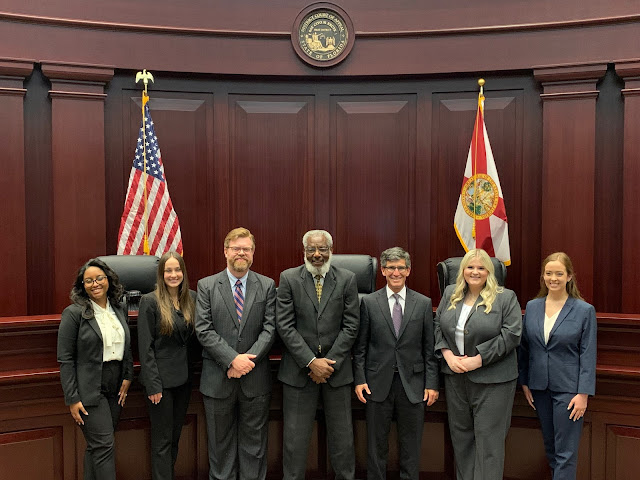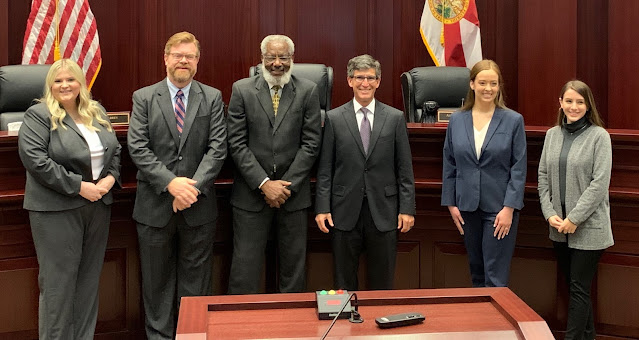Share This Article:
Last fall I wrote about the amazing transition of the annual Zehmer Moot Court competition. This is usually held at the annual workers' compensation conference each August, but 2021 was delayed. In Perseverance and Poise (November 2021), I congratulated the organizers and participants for their successful pivot to a virtual preliminary round. I cannot stress enough the contributions of Hon. Jacqueline Steele, Tracey Hyde, Esq., and Amie DeGuzman, Esq. They always produce a great event, but their efforts and achievement in 2021 are truly superlative.
The students did an exceptional job of adapting to the virtual platform. Some will note that this next generation is exceptionally abled technologically, but it was nonetheless a challenge for them to pivot into the digital world. That they adapted so readily is a tribute to their ingenuity and flexibility. Nonetheless, their absence from the actual conference in December left me missing the competition, see What is Different (December 2021)
January 2022 brought me to the Florida First District Court in Tallahassee. The various virtual rounds had delivered two finalist teams, and the return to an in-person environ. In the ceremonial courtroom they gathered before a "hot panel" of the Court, judges Lewis, Bilbrey, and Tanenbaum were prepared and curious. They engaged with vigorous questions, listened intently, and deliberated at length.
The Zehmer contest emulates the reality of workers' compensation practice. A fictional problem is delivered and the students strive to identify critical issues in some decisions rendered by a fictional trial judge. They research various legalities and precedent, then prepare an appellate brief in which they describe the issues and address allegations of error by the trial judge. Brief writing, any writing, is a critical skill for lawyers. Some believe it is becoming a lost art, but perhaps not.
During the contest, in various rounds, each team will find itself advocating each side of the case: the appellant seeking a reversal of the judge's conclusions and the appellee striving to convince the Court to let the trial decision stand. Most appellate lawyers will admit they prefer to be the appellee, seeing that role as advantageous, defending the judge's order. And, in many instances, one side of the case is perceived as "easier" or at least easier to advocate. Some contend that prevailing in a contest such as this may be influenced by which role is drawn in the pairing. Despite such perceptions, either side on any day may prevail.
The contest is challenging. First, the research and writing are rigorous. Second, it involves students standing and orating in front of a tough audience of strangers, of judges. And, finally, it involves critique by judges who are very versed in the law, the process, and the technique of oral advocacy. In short, it is a difficult activity in a fairly tough room.
Despite this, the presence and performance of the students in this contest is always impressive. The 2021 final round in Tallahassee was no exception. The outcome was a "split decision," rather than unanimous. Judge Lewis explained in his comments afterward that the Court struggled with the outcome because the two teams were so exceptionally prepared and able. All of the judge's critiques and comments were laudatory, and peppered with hints, tips, and advice on effective advocacy. Many practicing lawyers would benefit from the chance to have such feedback from esteemed jurists.
The winning team is in their third year of law school at FIU and is acutely focused on graduation, careers, and the future. The Baylor team is in their second year, and thus about half-way through the law school experience. It is impressive that people in the midst of their education are as poised, focused, and formidable as these four are. It is more impressive that the same can be said of all the students that enter this contest, win or lose, year after year after year. The Zehmer consistently attracts exceptionally hard-working and strong advocates. In 2021, there were 20 teams; in 2022, likely more.
When the program concluded, I had the chance to chat with each team about their perceptions of the program, their career plans, and the law. Not one of them expressed any interest in practicing workers' compensation law. That was not a surprise, but nonetheless a disappointment. People seem to typically go to law school with dreams of criminal law, employment law, commercial litigation, tax law, family law, and more. But, somehow, no one seems to ever dream of workers' compensation.
Each of these advocates expressed their interest in various areas of the law. They have enthusiasm, goals, and ability. From my brief time with them, I have no doubt that any employer would be well-served by these outstanding and hard-working advocates.
Some schools enter more than one team. A member of a second FIU team was recognized with an award for Best Oral Advocate. There are also awards for the best written brief, which in 2021 was won by Miami University, and second place was a tie between the Baylor team described above and the Mississippi College team. In short, the awards each year are typically distributed across more than the team prevailing in the final round. There is, a great deal of perseverance, talent, and hard work evident from all of the contest participants.
There are doubts expressed periodically by my generation. I hear expressions that make us sound geriatric and cliché ("you kids get off my lawn"). There are lamentations of "these kids today" how "law school is not as hard as it used to be," and more. But, Ms. Lee, Ms. Michel, Ms. Ginger, and Ms. Means demonstrate that there is much to celebrate in the next generation. There are bright and effective students preparing to take over this profession. The future holds much promise indeed.
I celebrate and congratulate them, while I do lament that they do not dream of workers' compensation. Perhaps through efforts like the Zehmer competition we draw attention to this law, practice, and challenge? Past competitions have included some that sought to practice workers' compensation, and I have always been particularly pleased to see those students graduate and enter this practice.
When August 2022 rolls around, which will be quicker than we think, take the time to sit through a round at the WCI. It is refreshing, interesting, and engaging. And, if you are involved with a law school, please encourage it to enter and join us for the Zehmer competition in 2022.
First place team from FIU, Ms. Samantha Lee and Ms. Kristy Michel, with judges and coach Ila Klion.
Runner up team from Baylor, Ms. Jillian Ginger and Ms. Emily Means, and coach Elizabeth Gardner.
By Judge David Langham
Courtesy of Florida Workers' Comp
Read Also
About The Author
About The Author
-
Judge David Langham
David Langham is the Deputy Chief Judge of Compensation Claims for the Florida Office of Judges of Compensation Claims at the Division of Administrative Hearings. He has been involved in workers’ compensation for over 25 years as an attorney, an adjudicator, and administrator. He has delivered hundreds of professional lectures, published numerous articles on workers’ compensation in a variety of publications, and is a frequent blogger on Florida Workers’ Compensation Adjudication. David is a founding director of the National Association of Workers’ Compensation Judiciary and the Professional Mediation Institute, and is involved in the Southern Association of Workers’ Compensation Administrators (SAWCA) and the International Association of Industrial Accident Boards and Commissions (IAIABC). He is a vocal advocate of leveraging technology and modernizing the dispute resolution processes of workers’ compensation.
More by This Author
- Jun 05, 2023
- Judge David Langham
- May 20, 2023
- Judge David Langham
Read More
- Mar 26, 2025
- Liz Carey
- Jan 30, 2025
- Liz Carey
- Aug 12, 2024
- Frank Ferreri
- Aug 06, 2024
- Frank Ferreri
- Aug 05, 2024
- Frank Ferreri







